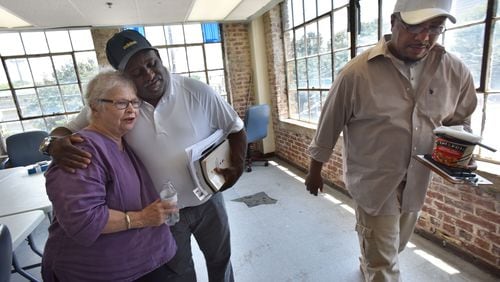Olympic fever swept across the city in September 1990 when it was announced Atlanta would host the 1996 Summer Games. Residents were shocked, politicians astounded, business leaders brought to tears.
Four years later, that zeal had slowly faded. Organizers believed excitement would return once sponsors were secured, the stadium was squared away and controversies became yesterday’s news. But they needed a boost. A ceremony was planned for the $5 million overhaul of Woodruff Park, the first major pre-Olympics construction project to break ground.
On a foggy Monday morning in October 1994, dapper businessmen and Olympic dignitaries arrived at the 6-acre park on Peachtree Street to the sound of string instruments played by Georgia State University students and the sight of a color guard.
Mayor Bill Campbell opened the ceremony by praising the park’s renovation plans. Other community leaders followed, taking turns at the microphone, and as they did, the faint sound of a chant filled the air, growing stronger.
No justice, no peace! shouted scores of protesters, some carrying signs, who filed into the park, drowning out the boosterish remarks. "Stop the Olympic war on the poor," said one sign. "WHATIZIT? More displacement of the poor," said another, poking fun at the much-maligned Olympic mascot.
Attempting to ignore the interruption, Campbell was guided by his staff toward a hardhat and shovel for a photo op. But before he could lift a scoop of dirt, several protesters fell to the ground beneath him, lying face up, grinning.
Asked by reporters if the homeless dampened the Olympic spirit, Campbell responded, “Of course not. They add to the spice and diversity of Atlanta.” They added to the next day’s headlines as well.
Sitting back watching it all unfold was 52-year-old Anita Beaty, a five-foot-two firebrand with blazing-red hair. As executive director of the Metro Atlanta Task Force for the Homeless, Beaty often tried to subvert some of Atlanta’s defining moments on the world stage by deflecting attention to the city’s growing homeless population.






